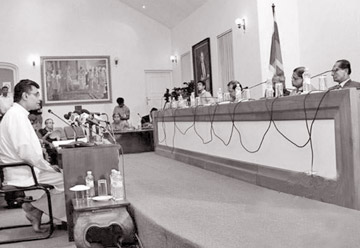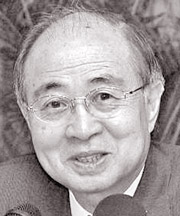May Day rebuff to Darusman cacophony
 On
May 21, 2009, just days after the final rout of the LTTE, the Wall
Street Journal in an editorial comment observed that ‘The war on terror
scored a big victory this weekend with the Sri Lankan Army’s battlefield
defeat of the terrorist Liberation Tigers of Tamil Eelam. The event ends
one of the world’s longest running civil wars. It also vindicates one of
the major lessons of September 11: Most of the time, terrorists have to
be defeated militarily before political accommodation is possible’. On
May 21, 2009, just days after the final rout of the LTTE, the Wall
Street Journal in an editorial comment observed that ‘The war on terror
scored a big victory this weekend with the Sri Lankan Army’s battlefield
defeat of the terrorist Liberation Tigers of Tamil Eelam. The event ends
one of the world’s longest running civil wars. It also vindicates one of
the major lessons of September 11: Most of the time, terrorists have to
be defeated militarily before political accommodation is possible’.
It was taking the wider view of the reality and impact of Sri Lanka’s
success in defeating the forces of terror, in the face of determined
opposition to this move, even by the United States, which, has since
September 11, 2001 led a ‘War on Terror’ of its own, drawing NATO also
into the attack. The WSJ made an assessment of the service that Sri
Lanka had done to the world in showing the necessity and ability to
defeat terrorism militarily.
Tamil Diaspora
|

One of the LLRC sittings. Picture courtesy: Google |
The WSJ comment of that day also observed that: ‘Colombo also learned
lessons from its earlier failures against the Tigers. The military
improved its training in counterinsurgency tactics, and Colombo invested
the resources to enable the army to hold territory it won. Moves by the
United States, Britain, Canada and other countries to freeze Tiger
fundraising among the Tamil Diaspora helped weaken the Tigers. President
Rajapaksa wisely ignored international calls for a ceasefire as he got
closer to victory, including threats from the Obama administration to
block $1.9 billion in International Monetary Fund aid money.
Its conclusion was that: 'As Colombo starts to grapple with those
post-conflict problems, everyone else can take note: Thanks to a
strategy of defeating the insurgency, Sri Lanka is now in a position to
talk seriously about peace and economic growth.
When negotiating with terrorists doesn’t work, beating them does’.
As a journal of in-depth analysis and reporting, the WSJ had made a
clear assessment for the need to defeat LTTE terror and rightly
concluded that in the search for peace, where negotiation and ceasefires
with terrorists do not work, defeating this was necessary and as Sri
Lanka had shown the way, decidedly possible.
International community
Today, while the so-called ‘international community’ that keeps out
the most populous of nations in the world community, including its
emerging powers, is seeking to avenge Sri Lanka for its rout of the LTTE
on alleged grounds of ‘accountability’, the WSJ remains firmly of the
view that the defeat of LTTE terror was a necessity.
It goes further and states, ‘there is a real danger that an
international war-crimes investigation on Sri Lanka would do more harm
than good.’ It is not ready to be a cheer leader for the Darusman
Committee, appointed by the UN Secretary General to advice him, going on
an international witch- hunt against Sri Lanka and its political
leadership, to please those who are still pushing the LTTE’s
separatist-terrorist agenda through the purchase of Western politicians
and manipulation of the media.
In what appears to be a world full of cheer leaders for the Darusman
Committee and its wholly flawed findings, the WSJ has come out with the
hardly stated reality that in the call for an international probe and
punitive action against Sri Lanka, the UN and other international
parties are in danger of running off the rails. The WSJ states the (Darusman)
report’s calls for a more formal UN investigation, perhaps culminating
in a war crimes tribunal, which has been echoed by various human rights
groups and may find a sympathetic hearing among some governments, could
prove to be the wrong approach for Sri Lanka.’
|

Yasushi Akashi |
Military effort
Moving away from the clutter and roar of the well-manipulated opinion
builders in the West, seeking revenge for their collective failure to
save Prabhakaran and the LTTE from the inevitability of defeat after
three decades of ruthless terror - the bloody likes of which none of the
Western countries braying against Sri Lanka have faced so far - the WSJ
makes a very reasoned assessment of how the situation in Sri Lanka
should be dealt with: In its comment of April 26, 11 the WSJ states:
'The international community already is deeply discredited in many Sri
Lankan eyes for its failure to stand against the neo-Marxist Tigers as
they waged bloody battle on Sinhalese and Tamil civilians alike.
As the war neared its conclusion, foreign powers criticized the
military effort without ever offering a plausible alternative.
‘The international community’ would do better to focus on building
the institutions that will eventually allow Sri Lankans to grapple with
their own war history. That might mean, for now, focusing less on the
end of the war and more on issues such as demanding greater press
freedom and a more open political process.
Unique experience
‘Sri Lanka is at a critical moment as it emerges from a decades-long
war and rebuilds its politics and economy. Leaders abroad have to tread
carefully, lest they inadvertently push the country back into sectarian
strife.’
Unmoved by the ‘popular’ views of some Western governments and
leaders, as well as organizations such as Amnesty International and
Human Rights Watch, whatever their observations on other situations
could be, the WSJ takes up the position that terrorism, especially of
the type and scale of the LTTE has to be defeated, for peace and
democracy to survive and grow, and what is most important is not how a
battle against such terror was ended, but that it has in fact been
ended.
The meeting that the Editorial Board of the WSJ had with President
Mahinda Rajapaksa, on the sidelines of the UN General Assembly sessions
last September in New York, where tough and probing questions were asked
from the President on a wide range of issues from the defeat of the LTTE
to reconciliation and rehabilitation of former terrorists, would have
given the WSJ a better understanding of reality in Sri Lanka.
It would have strengthened the WSJ’s view on Sri Lanka’s unique
experience in defeating terror, that is evading so many other countries
and leaders, with much more economic and fire power to use, with scant
regard for Human Rights, crimes against humanity or war crimes, which is
the current chorus of the Darusman Committee and those singing from the
Hymn Sheet of Accountability of the UNSG’s Office.
In a situation where the ‘International Community’ is willingly
missing the wood for the trees on Sri Lanka’s defeat of terrorism, it is
necessary to repeatedly pose the question as to how Prabhakaran and his
forces of terror could have been routed, but for the way it was done.
Battles that involve arms do have bloody endings. The pain for those
seeking peace would certainly be more when those carrying arms for
terror-driven separation, uses its own people as human shields; it must
be worse when those calling for ceasefires and respect for the rules of
combat do not offer a suitable alternative, other than subjugation to
terror.
UN should not interfere
It is necessary here to recall the post-conflict observations of the
Japanese diplomat Yasushi Akashi, who repeatedly visited Sri Lanka in
the search for peace as a member of the Co-Chairs for the Peace Process.
The seasoned diplomat was very clear in his comments on the role of
the UN in the post-conflict situation in Sri Lanka.
Here is what is said in June 2010: ‘The United Nations should not
interfere in Sri Lanka but only offer suggestions and ideas in dialogue
with the Government.’
He added that the proposed panel to advise Secretary General Ban ki-Moon
should be to offer insights and views to the Sri Lankan government if
needed, which has also created its own Commission of Lessons Learnt and
Reconciliation.
Akashi made these statements at a press briefing ending his 20th
visit to the country. Welcoming the appointment of the Commission as a
positive step towards peace building and reconciliation, Akashi pledged
Japan’s support in these efforts. Akashi also expressed optimism of the
positive changes taking place in the post-conflict Sri Lanka, adding
that it was a great opportunity for national and ethnic reconciliation.
The current cacophony of hosannas for the Darusman Committee coming
from wholly expected sources, with considerable links to the pro-LTTE
expatriate Tamils in the West aka Tamil Diaspora, will be heard for some
time.
May Day has in the past been a rallying point for important national
and political struggles, as in the struggle against colonialism and
imperialism. It is the true strength of the working people, transcending
the barriers of ethnicity, religion, caste and narrow politics that can
surely defeat the machinations of foreign and allied forces that seek to
manipulate the United Nations and its institutions, human rights
organizations and sections of the international media in the current
campaign against Sri Lanka. Such unity is the rallying cry for Sri Lanka
today, and the best message to the world on our commitment to peace and
reconciliation. |



